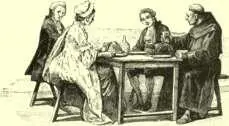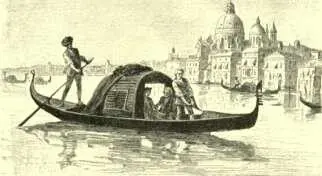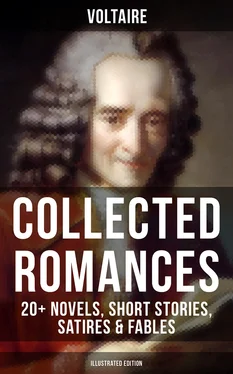“I have heard great talk,” said Candide, “of the Senator Pococuranté, who lives in that fine house at the Brenta, where, they say, he entertains foreigners in the most polite manner.” “They pretend this man is a perfect stranger to uneasiness. I should be glad to see so extraordinary a being,” said Martin. Candide thereupon sent a messenger to Seignor Pococuranté, desiring permission to wait on him the next day.


CHAPTER XXV.
CANDIDE AND MARTIN PAY A VISIT TO SEIGNOR POCOCURANTÉ, A NOBLE VENETIAN.
Table of Contents
Candide and his friend Martin went in a gondola on the Brenta, and arrived at the palace of the noble Pococuranté. The gardens were laid out in elegant taste, and adorned with fine marble statues; his palace was built after the most approved rules of architecture. The master of the house, who was a man of affairs, and very rich, received our two travellers with great politeness, but without much ceremony, which somewhat disconcerted Candide, but was not at all displeasing to Martin.
As soon as they were seated, two very pretty girls, neatly dressed, brought in chocolate, which was extremely well prepared. Candide could not help making encomiums upon their beauty and graceful carriage. “The creatures are well enough,” said the senator; “I amuse myself with them sometimes, for I am heartily tired of the women of the town, their coquetry, their jealousy, their quarrels, their humors, their meannesses, their pride, and their folly; I am weary of making sonnets, or of paying for sonnets to be made on them; but after all, these two girls begin to grow very indifferent to me.”
After having refreshed himself, Candide walked into a large gallery, where he was struck with the sight of a fine collection of paintings. “Pray,” said Candide, “by what master are the two first of these?” “They are by Raphael,” answered the senator. “I gave a great deal of money for them seven years ago, purely out of curiosity, as they were said to be the finest pieces in Italy; but I cannot say they please me: the coloring is dark and heavy; the figures do not swell nor come out enough; and the drapery is bad. In short, notwithstanding the encomiums lavished upon them, they are not, in my opinion, a true representation of nature. I approve of no paintings save those wherein I think I behold nature herself; and there are few, if any, of that kind to be met with. I have what is called a fine collection, but I take no manner of delight in it.”
While dinner was being prepared Pococuranté ordered a concert. Candide praised the music to the skies. “This noise,” said the noble Venetian, “may amuse one for a little time, but if it were to last above half an hour, it would grow tiresome to everybody, though perhaps no one would care to own it. Music has become the art of executing what is difficult; now, whatever is difficult cannot be long pleasing.
“I believe I might take more pleasure in an opera, if they had not made such a monster of that species of dramatic entertainment as perfectly shocks me; and I am amazed how people can bear to see wretched tragedies set to music; where the scenes are contrived for no other purpose than to lug in, as it were by the ears, three or four ridiculous songs, to give a favorite actress an opportunity of exhibiting her pipe. Let who will die away in raptures at the trills of a eunuch quavering the majestic part of Cæsar or Cato, and strutting in a foolish manner upon the stage, but for my part I have long ago renounced these paltry entertainments, which constitute the glory of modern Italy, and are so dearly purchased by crowned heads.” Candide opposed these sentiments; but he did it in a discreet manner; as for Martin, he was entirely of the old senator’s opinion.
Dinner being served they sat down to table, and, after a hearty repast, returned to the library. Candide, observing Homer richly bound, commended the noble Venetian’s taste. “This,” said he, “is a book that was once the delight of the great Pangloss, the best philosopher in Germany.” “Homer is no favorite of mine,” answered Pococuranté, coolly; “I was made to believe once that I took a pleasure in reading him; but his continual repetitions of battles have all such a resemblance with each other; his gods that are forever in haste and bustle, without ever doing anything; his Helen, who is the cause of the war, and yet hardly acts in the whole performance; his Troy, that holds out so long, without being taken: in short, all these things together make the poem very insipid to me. I have asked some learned men, whether they are not in reality as much tired as myself with reading this poet: those who spoke ingenuously, assured me that he had made them fall asleep, and yet that they could not well avoid giving him a place in their libraries; but that it was merely as they would do an antique, or those rusty medals which are kept only for curiosity, and are of no manner of use in commerce.”
“But your excellency does not surely form the same opinion of Virgil?” said Candide. “Why, I grant,” replied Pococuranté, “that the second, third, fourth, and sixth books of his “Æneid” are excellent; but as for his pious Æneas, his strong Cloanthus, his friendly Achates, his boy Ascanius, his silly king Latinus, his ill-bred Amata, his insipid Lavinia, and some other characters much in the same strain, I think there cannot in nature be anything more flat and disagreeable. I must confess I prefer Tasso far beyond him; nay, even that sleepy taleteller Ariosto.”
“May I take the liberty to ask if you do not experience great pleasure from reading Horace?” said Candide. “There are maxims in this writer,” replied Pococuranté, “whence a man of the world may reap some benefit; and the short measure of the verse makes them more easily to be retained in the memory. But I see nothing extraordinary in his journey to Brundusium, and his account of his bad dinner; nor in his dirty, low quarrel between one Rupillius, whose words, as he expresses it, were full of poisonous filth; and another, whose language was dipped in vinegar. His indelicate verses against old women and witches have frequently given me great offence: nor can I discover the great merit of his telling his friend Mæcenas, that if he will but rank him in the class of lyric poets, his lofty head shall touch the stars. Ignorant readers are apt to judge a writer by his reputation. For my part, I read only to please myself. I like nothing but what makes for my purpose.” Candide, who had been brought up with a notion of never making use of his own judgment, was astonished at what he heard; but Martin found there was a good deal of reason in the senator’s remarks.
“O! here is a Tully,” said Candide; “this great man I fancy you are never tired of reading?” “Indeed I never read him at all,” replied Pococuranté. “What is it to me whether he pleads for Rabirius or Cluentius? I try causes enough myself. I had once some liking for his philosophical works; but when I found he doubted everything, I thought I knew as much as himself, and had no need of a guide to learn ignorance.”
“Ha!” cried Martin, “here are fourscore volumes of the memoirs of the Academy of Sciences; perhaps there may be something curious and valuable in this collection.” “Yes,” answered Pococuranté; “so there might if any one of these compilers of this rubbish had only invented the art of pin-making: but all these volumes are filled with mere chimerical systems, without one single article conducive to real utility.”
Читать дальше














